

 中文摘要:
中文摘要:
税收政策对于互联网金融这一新兴业态的健康发展,具有扶持和监管的双重功能。互联网金融税收政策面临的主要挑战包括:我国流转税占比偏高的税制结构。与信息化时代新兴产业发展的兼容性相对较低;企业所得税和个人所得税之间相互分立的“古典所得税制”。存在着一定的经济性重复征税。优化互联网金融税收政策可从以下方面加以谋划:兼顾税收优惠与税收公平原则;尽可能采用先征后退的税收支持方式;以互联网金融平台企业提供完备的涉税资料作为税收支持政策落实的前置条件;针对不同互联网金融业务类型,确定不同利益相关主体的应税节点。
 英文摘要:
英文摘要:
Tax policy bears dual functions as supporting and supervising internet finance during this new type of operation's development. The main challenges facing the tax policy for internet finance include the tax structure with a high proportion of commodity turnover tax has a relatively low compatibility with new industries' development in the information age, and the classical income tax system in which corporate income tax and personal income tax are separate has certain economic double taxation. To optimize tax policy for internet finance, we can plan from the following aspects: taking both principle of tax preference and principle of tax fairness into consideration; offering refund after collection as far as possible, making internet finance platform enterprises provide complete tax-related information, and determining schedules for different stakeholders according to different internet finance business types.
 同期刊论文项目
同期刊论文项目
 同项目期刊论文
同项目期刊论文
 期刊信息
期刊信息
